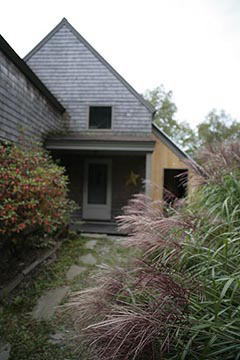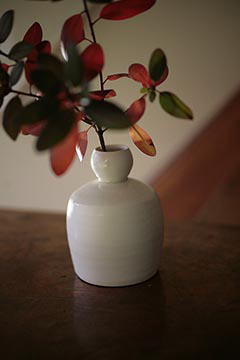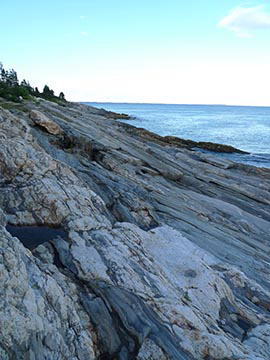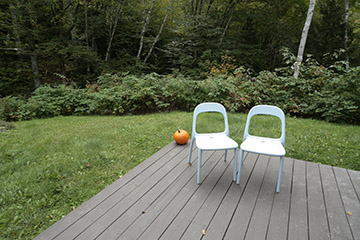|
[T]ruth can be reached only
through the comprehension of opposites.
-Okakura
Kakuzo, from The Book of Tea
It is exciting when you meet
someone who has dreamt your dream. From
a young age I knew that the small rural town I grew up in couldnft fulfill all
of my desires, answer all of my questions or teach me all that I craved to
know. And so, at 14, I began my
journey. I left my home in northeastern
USA and for ten years I took every opportunity available to move. Schooling took me across my vast country to
its western edge. I also traversed
boarders north and south and over seas.
Curiosity was my constant companion.
Despite being a shy, quiet girl, I was fascinated with humanity and
desperate to experience the varieties of life.
I wanted to see how other people lived.
Little did I know, just as my desire to roam was igniting, Hanako,
already well into her teens, was crisscrossing the eastern seaboard of the
United States, exploring her way straight towards the small town region I had
left. She too had felt that her rural
town in Japan couldnft fulfill her desires, answer all of her questions, or
teach her all that she needed to know, and so at 16 she left.
It would take a decade before our paths would cross. Despite vast differences in personality,
cultural training and life experiences, we recognized in each other a kindred
spirit. We were two loners, two roamers, but we shared the desire to live a risky
and frightfully challenging life, all for the chance at a fascinating existence. In the near decade since we met, we have both
experienced being a foreigner. It is
deeply rewarding. Living outside of your
own culture sheds light on yourself and your ways. It expands your mind and opens your eyes to
new modes of thinking and being in the world.
Hanako and I both profoundly appreciate that experience and want to
embrace it as a regular part of our lives.
But it is also spiritually trying.
Without a common cultural foundation, misunderstandings and frustrations
are frequent. Because we understand
those particular challenges, we also recognize each otherfs need for time
immersed in our native cultures.
Therefore it has long been a dream of ours to split our time between
Japan and the States.
 |
We spoke often of this dream but it was always in the realm of gsome
day.h But in the summer of 2009 we had
the opportunity to buy a house in Maine, a place we have fallen in love with
over the past several years. Though wary
of the financial and logistical challenges of owning a second home in a second
country at this stage in our lives, we took a leap of faith. Sometimes, in order to challenge ourselves,
grow and evolve, we must step out of our routine and extend ourselves a ways
into the realm of the unknown. It has
now been almost a year and a half since and it feels as though we have
fulfilled a lifelong goal prematurely. A
vague, undefined, abstract idea became a reality in a matter of moments. Itfs like waking from a dream to find out it
wasnft a dream after all. But there are
times when the universe offers you solutions to problems you havenft yet fully
realized.
Hanako admits that, though unexpected, it was good timing for a
shift in lifestyle. Four years ago we
settled in Japan and in that time, Hanako worked furiously to found and build
her business, monohanako. It exhausted
her. Absorbed in relentless production,
she was running the risk of losing the core convictions behind her product. Through 16 years of living in the States, Hanako had come to see her own
culture more clearly in light of its differences from her adopted western
culture. In that
post college drift in which young adults, freed from the constraints and
routines of schooling, must manifest their own destiny for the first time,
Hanako thought hard about where to turn her attentions. She realized that she wanted to pursue
something that would engage all the senses and enrich daily living, something
artistic. She wanted to embrace her
cultural instincts and do something cultivated in daily life. She had come to appreciate Japanfs food
culture as the core expression of her heritage.
She embraced pottery because it would suitably convey her values. However pottery was the articulation of a
message, not the message itself. But
four years of running monohanako, racing to meet a constant stream of
deadlines, had overshadowed that message.
She had become a slave to her own production skills and the motivations
of working to champion Japanfs food culture and encourage people to live a rich
daily life were falling dormant. Stepping
out of her routine and culture again will give her an overdue fresh perspective
on her work and intentions. And the
quiet pace of life in Maine will afford her much time to refine her work and
rekindle those inspirations.
For myself, living in Japan has pried my eyes, heart, and spirit
open in fascinating ways. I feel blessed
that I was introduced to Japan under these circumstances. Unlike many westerners who travel here, I had
no preconceived notions of what I would encounter, no romantic concept of the
exotic East, no pre-judgments. And I
came straight into a family. I have
never had to rely on a guidebook or been in danger of slipping into any tourist
track. I have been gifted a native
experience and on many levels I have been inspired beyond any
expectations. I have been awed by the
heartfelt kindness of unlikely friends and allies. And without fluid language skills, I was
reminded of the importance and reliability of living and learning through
sight, smell, sound, taste, touch and intuition. It has been a rich, deeply felt experience
and has re-enforced my priority to live always with my senses alert.
But I have also missed and hence
more deeply understood and valued many key aspects of my culture in that time
away. I grew up in a culture full of
tight personal bonds. The line between
friends and family was often blurred. In
our community, we show our minds and hearts to each other and risk
disagreements for the potential of deep connections. We speak our thoughts honestly and
openly. We easily identify similarities
and differences in each other. We take
comfort in the former and respect the latter.
With heartfelt intentions we open our homes without reserve and casually
invite each other in to share meals on a regular bases.
 |
Experiencing two cultures naturally invites comparisons. In recognizing the strengths that we admire
in each culture, Hanako and I have also identified shortcomings. Americans possess the nature to open their
doors and host each other with casual ease.
But though they have a gmake yourself at homeh way of welcoming others,
beyond a basic tidying up, Americans frequently fall short in exerting extra
effort that leads to true hospitality.
It is a special kindness to create a welcoming environment by putting out
fresh flowers, burning incense and attending to your guest. Also, a little more attention would do
wonders for the American dinner table.
In small pockets around the country, there is a blossoming interest in
healthy, locally produced foods. But
most Americansf sense of taste is still underdeveloped and they are too easily
satisfied. They believe that simply
cooking with quality ingredients will lead to the best flavor. Much potential is lost due to a lack of basic
preparation and presentation skills.
Seasonal ingredients, proper treatment and beautiful pairing with
tableware are the foundations of Japanfs food culture. Eating well and beautifully is the foundation
of a gratifying lifestyle.
At the same time modern Japanese are losing sight of this exquisite
aspects of their heritage. It is a
crucial time to champion the Japanese obsession with food and preserve the
subtle complexities found in traditional Japanese cooking. And what better way to do so than to actually
cook and share meals with family or friends?
In this way, the American notion of opening the doors of our homes and
sharing our lives is essential. Japanese
show a strong interest in the customs of hospitality but few make it a regular
practice. Sadly, we are living at a time
when the notion of true hospitality and personal lifestyle reside more in books
and magazine articles than in homes and hearts.
These days everything is a commodity to be bought, or at least desired. And to my eyes, lifestyle appears to be the
leading commodity in Japan. People are forgetting that hospitality is an attitude, not a commodity. It is a display of spirit, not possessions.
An excessive interest in and reliance on the media is breeding a
climate in which people forget to feel for themselves. Books, magazines and television can be an
excellent source of education and inspiration.
They introduce ideas and things that we might never otherwise know
about. But rather than finding
inspiration there for our own lives, the public appears to be living
vicariously through the media. Media can
only go as far as to introduce something.
If we are interested, it is our job to investigate it further and make
personal choices. But too often the
public tries to replicate what is seen in the media. The result is that we are losing our own
aesthetics and our own sensing abilities.
The media can stimulate our personal lifestyle choices but it must never
be mistaken as a manual for living. The
foundation of true hospitality is a desire to show someone your care in the
form of a lovingly prepared meal and a welcoming atmosphere. It must come from the heart in order to be
authentic. It must be an original
expression, not a copy. It is critical
that we think for ourselves and make our own choices.
 |
The developments over the last year and a half have inspired a lot
of self-reflective conversation between us.
Hanako and I feel compelled to draw up our courage and embrace this
unique situation of living in two cultures.
We are thinking hard about our priorities and motivations. Though we
must migrate like snow birds every six months, we have been inspired to invent
a way of life that can translate across boarders. Though our time is divided, we want to
maintain a single focus in life. It
feels imperative to do so such that we can maintain some continuity despite a
regular, radical shift in environment.
Through our individual and shared experiences, Hanako and I have
arrived at the same truth: the most rewarding task in life is to cultivate a
meaningful, sensing daily life. We see
the particular strengths and weaknesses of American and Japanese cultures in
this area and there is much that one can learn from the other. We have a rare opportunity to link them and
build a bridge between here and there.
Like a ripple in a lake, we hope that by sharing these observations and
understandings with our friends and colleagues in both countries, we can
encourage others to create a deeply personal, rich sensing life.
 |
The success of this adventure is un-assured and un-assumed. We have embarked suddenly, but not
blindly. The results may still dwell in
our hopes and dreams, but we are dreaming the same dream. And for sure we have left the realm of
routine. Because of it, we are daily
expanding our understanding of ourselves, of each other and of this beautifully
imperfect and unexpected world we live in.
-Prairie
Stuart-Wolff
|





